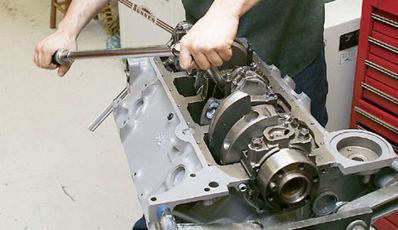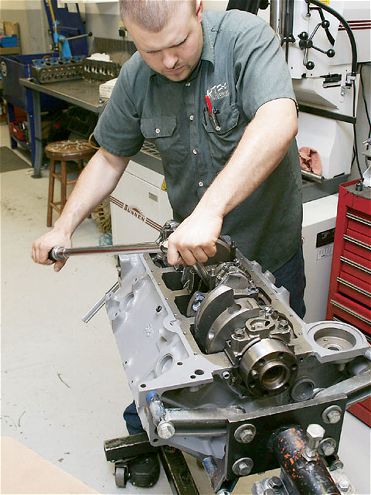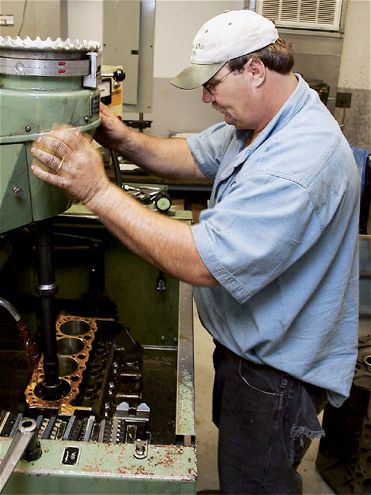
 Building a custom race engine is difficult and best left to the professionals such as our contacts at KT Engine Development. However, assembling an engine to stock specifications is a lot easier with the help of rebuild kits from providers such as Day Motorsports-and it can save you money.
Building a custom race engine is difficult and best left to the professionals such as our contacts at KT Engine Development. However, assembling an engine to stock specifications is a lot easier with the help of rebuild kits from providers such as Day Motorsports-and it can save you money.
There are two ways to race cheap when it comes to Pure Stock level racing engines: Race junk that's cheap up front but won't last, or use a well-prepared block that uses economic or mostly stock parts that will last a season or more. The second option is more expensive up front but should be more powerful and actually save money in the long run compared to the barely-running junkyard motor that blows up after just three races.
Engine rules for the entry-level racing classes-everything from Enduro, Pure Stock, Strictly Stock, and others-are normally based on keeping everything in the engine as is from the factory. No aftermarket cams, lightweight valves, or high-zoot springs. Considering that you can buy OEM replacement parts for pennies on the dollar compared to racing specific hardware, limiting engine parts to "stock replacement only" in entry-level race cars makes good financial sense. There will always be racers in a hurry to get on the track that will buy any junker that runs and pray for the best, but a well-prepared engine will run better and last longer any day of the week-even with the same stock replacement parts.
The key to winning in the stock classes is attention to detail. Even if it still runs, an engine with 100,000 hard miles of road work on it is bound to be worn and not as efficient as it used to be. Fortunately, engine rebuild kits are both plentiful and affordable, especially for the venerable Chevrolet 350. You don't have to have the pedigree of one of Rick Hendrick's engine builders to put one together yourself. You don't have to understand every facet of engine theory or have written a master's thesis on valve timing to properly assemble an engine. If you are meticulous and comfortable around tools, you can do it. If you don't have experience rebuilding engines, find a friend who does and ask him or her to coach you, or check out the many books available on engine building.
 The block we're using for our project is the ever-popular Chevy 350. Because this engine is so popular for racing, rebuild kits are plentiful, and it shouldn't be too hard to find a racer friend familiar with assembling one. Here, the cylinder bores in our block are being honed so that the cylinder will be good and round. The cylinder walls are also given a crosshatch texture in this process that improves cylinder oiling.
The block we're using for our project is the ever-popular Chevy 350. Because this engine is so popular for racing, rebuild kits are plentiful, and it shouldn't be too hard to find a racer friend familiar with assembling one. Here, the cylinder bores in our block are being honed so that the cylinder will be good and round. The cylinder walls are also given a crosshatch texture in this process that improves cylinder oiling.
You can take the money you save and spend some of it on quality machine work on your block and heads. The key to an efficient and durable engine is close attention to tolerances. A quality machine shop specializing in engines can perform critical checks and tell you what, if any, part of your block needs work. For example, if the main bores are out of alignment-usually from detonation-your engine will still run, but the mains will be too tight against the crank journals in some locations, which will cost you horsepower and put the engine at risk of spinning a bearing. In the greater scheme of things, a little money spent on machine work up front is a lot less expensive than buying two engines in one season because the first one grenaded on you.
This story should help you get an idea of what is involved in assembling your own engine as well as the type of services a quality machine shop can provide (in our case, KT Engine Development). Giving you the blow-by-blow for every step of building an engine is beyond the scope of this article, but we hope it gives you some ideas for getting a legal and financial advantage on the rest of the field when the rules call for "stock replacement only."
What's It Cost?It's easy to tell you that good machine work on your block and heads will save you money in the long run without telling you what it's going to cost up front. To give you a better idea of what certain machining processes cost, we've compiled a list of average charges at most engine shops. The numbers are estimates that you will generally see, but if you find a machine shop that charges lots more than this, you can ask why. Also, it's just as important to be skeptical of any shop that charges significantly less because they might be cutting corners and sacrificing your quality for their time. Hopefully, the block you use for your foundation won't require every one of these processes, but it's also rare to find an engine with 100,000 miles on it that doesn't need any machine work.
Process Cost Align-hone mains $150 Balance crank ${{{200}}} {{{CC}}} head $75 Bore cylinders (8) $150 Install cam bearings $20 Deck block $125 Deck heads (2) $50 Pressure test cylinder heads (2) $100 Hone cylinders $100 V-8 valve job $150